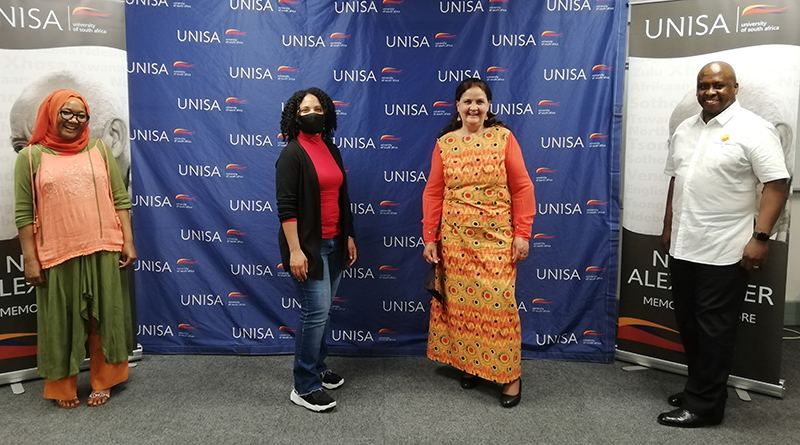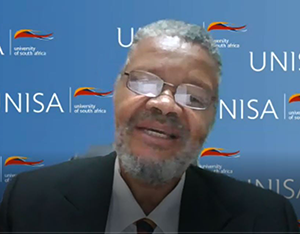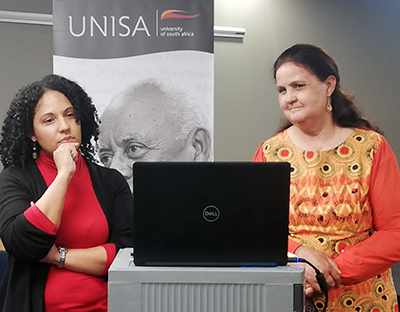

Dr Shahieda Jansen, Dr Lydia Cairncross, Dr Sophia Kisting, and Mdu Ncongwane

Prof Mandla Makhanya (Principal and VC) gave the welcoming address.
Despite Covid-19 restrictions, the eighth annual Neville Alexander Memorial Lecture on 23 October 2020 went ahead without a hitch, thanks to the wizardry of modern technology and the tireless efforts of those working behind the scenes. Dr Shahieda Janse, Acting Regional Director for the Western Cape Region, opened proceedings with a few introductory remarks. Delivering the welcoming address, Professor Mandla Makhanya, Principal and Vice-Chancellor, noted the refreshing and interesting topic of this year’s lecture—Building grassroots political movements for radical change: Lessons from the activist life of Neville Alexander—as previous lectures focused predominantly on the icon’s intellectual and linguistic achievements.
Changing the world
This year the focus of the event continued building on Neville Alexander’s legacy by delving into his activism. Dr Sophia Kisting—medical doctor, long-time friend, and activist in her own right—delivered this year’s memorial lecture. Through a series of photographs, she shared stories from Neville Alexander’s life and how he served as inspiration to people all around the globe. He believed that the world could be changed by and in the interests of ordinary people.
Neville Alexander was involved in a myriad of radical engagements at a grassroots level. For some he was the catalyst, and for others he was just part of a collective. These ranged from the political, social, and even linguistic, from the Yu Chi Chan Club, South African College for Higher Education (SACHED), Project for Alternative Education in South Africa (PRAESA) and the Workers Organisation for Socialist Action (WOSA), to name a few. The central point of all these movements was to shift the centre of power in the interest of working people and of the urban central and rural poor. This was a point he was most passionate about and served as the mainstay of all his activities.
Working as a collective, not as an individual
Kisting used the opportunity to remember those who are not with us anymore, those who helped shaped the collective alongside Neville Alexander. Particular mention was made of Audrey Meyer, who was placed under house arrest during apartheid, and Ursula van der Heyden, whose husband Leslie served time on Robben Island alongside Neville Alexander.
Those who worked alongside Alexander understood that besides working as a collective and not as an individual, one had to learn to utilise or generate their own resources. This encouraged independent thinking and limited the influence of third parties. The photo essay portrayed the various themes Neville Alexander’s activism espoused, including environmental and gender concerns, multilingualism, and engagement with trade unions including industrial workers, health workers, and the like. The latter, said Kisting, had a huge impact on her life as a medical doctor working with sick workers, trying to find ways to engage at workplaces to prevent illnesses that form because of working environments. She recalls that it was through Alexander’s profound influence that, as a young doctor, she was introduced to a different way of looking at the history of South Africa. “Our history is so different; we can respect our people so much more, we can find our heroes on our continent, people who are from and for this continent right here.”
In her closing remarks, Kisting said that we can learn so much from Alexander’s engagement at a grassroots level if we “continue to respect the ideas of humility, respect the poor, of working for the poor, of striving for equality and striving for a better world. We have the power to influence our environments, to change the world around us in little ways”.

Dr Lydia Cairncross (Discussant) with Dr Sophia Kisting, who delivered the eighth Neville Alexander Memorial Lecture at Unisa
Spotlighting every fault line of the racial capitalist system
Discussant Dr Lydia Cairncross—daughter of Dr Sophia Kisting, Associate Professor of Surgery at UCT, health activist, and former comrade of Neville Alexander—spoke from her position as “an exhausted healthcare worker in the aftermath of the Covid-19 pandemic”. She said that it had been stressful and exhausting to witness the destruction the disease has caused throughout communities, as well as to witness the “pandemic spotlight every social, political, and economic fault line of the racial capitalist system we live in”: The stark divide of the have and the have nots, those who could work from home and those who were on the front lines. Schools that could place children 1.5m apart and could open and those with 50 children in a classroom and could not.
Despite many people mobilising to combat the pandemic, the system with its hierarchies and authoritarian use of power triumphed. Even though community education and grassroots-based health promotion is the way to control the spread of this epidemic, the system is dictated by those who hold the power.
Holding people accountable
Quoting B Chikulo, Dr Cairncross said that the only way to hold people accountable in our country is through “the smoke that calls”. And this is what, she says, Neville Alexander and so many others spoke of the importance of social movements of our time. These social movements are, irrespective of whether they are large or small, forces of power. The question remains, however, how do we bring these social movements together to build the broader power that can generate radical political and economic change—to build a better society?
Her insight into how we can work towards this is to recalibrate our energies and build power differently. That we must recognise that every individual has inherent value and unique knowledge that can contribute to answering the question posed above, and to vehemently oppose the hierarchy imposed on us by this world by “building egalitarian, genuine relationships across all lines of social division”.
A lively question-and-answer session followed the lecture, expertly moderated by programme director Mdu Ncongwane, while Dr Keith Jacobs, Acting Deputy Registrar, concluded the evening with the vote of thanks.
You can watch the eighth annual Neville Alexander Memorial Lecture on MS Teams here.
*By Vicky-Lee Lee-Shew, Acting Communications Manager, Western Cape Region
Publish date: 2020-10-28 00:00:00.0